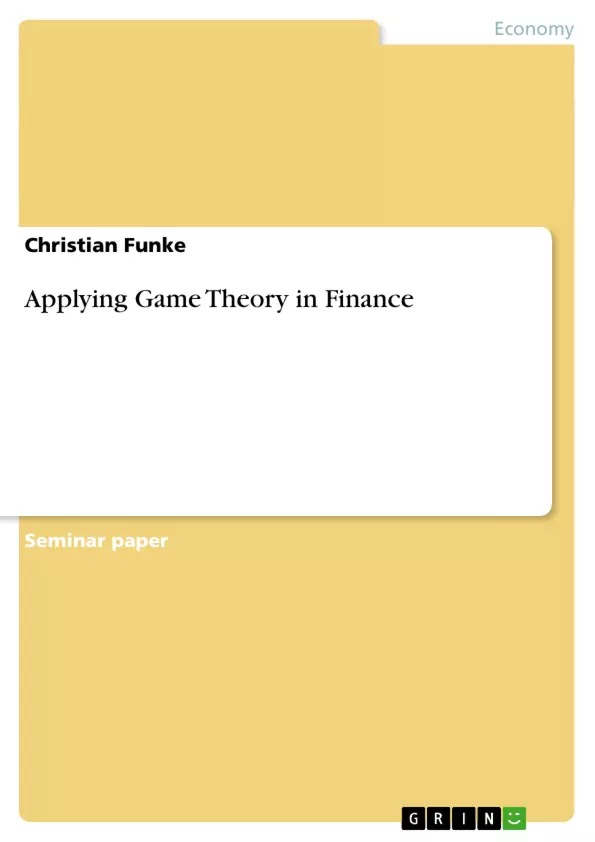The groundbreaking work of MODIGLIANI & MILLER (MM) introduced the rigors of economic analysis to financial research. This is generally considered the beginning point of modern managerial finance. Their first economic models were challenged by financial practitioners for being overly simplistic in their assumptions and, therefore, lacking real world application value. MM acknowledged and addressed this fact in their first paper. Later models relaxed some assumptions, such as symmetric information or complete contracts, while trying to retain an explanatory value in the spirit of the original MM papers.
This incorporation of more realistic elements, such as strategic interaction and asymmetric information, brought several problems to financial economists’ models: they required a lot of definitions, became even more complex and were not easily comparable. Game theory provided a solution for those problems in its first applications to economics in the 70s and 80s: a set of common definitions and a basic language to guarantee comparability and empirical testability of financial models using game theoretic concepts. Nowadays, there are few issues in finance research which have not been modeled by applying game theoretic concepts, and therefore it is crucial to be familiar with the basics of game theory and its application in finance.
The objective of this paper is to provide an intuitive approach to game theory in finance by first giving an overview of the basic foundations of game theory, and then providing a survey of some selected applications most relevant to the financial practitioner.
Inhaltsverzeichnis (Table of Contents)
- Introduction
- Problem and Objective of the Paper
- Organization of the Paper
- Game Theoretic Foundations
- Basic Definitions
- Nash Equilibrium, Dominance, and Rollback
- Asymmetric Information
- Game Theory in the Context of Finance
- First Game Theoretic Concepts in Finance
- Enhancing Financial Theory with Game Theoretic Modeling
- Selected Applications of Game Theory in Finance
- Dividends as Signals of Future Cash Flows
- Signaling and Agency Models of Capital Structure Decisions
- Other Areas of Game Theory Application in Finance
- Critique & Concluding Remarks
Zielsetzung und Themenschwerpunkte (Objectives and Key Themes)
The objective of this paper is to introduce the fundamentals of game theory and its application in finance, particularly focusing on corporate finance.
- The incorporation of strategic interaction and asymmetric information in financial models.
- The application of game theoretic concepts to enhance the economic modeling of financial situations.
- The use of game theory to analyze real-world issues in finance, including dividend policy and capital structure decisions.
- The role of game theory in addressing current research areas and advancing the understanding of financial phenomena.
Zusammenfassung der Kapitel (Chapter Summaries)
- Chapter 1 provides an introduction to the paper, outlining the problem and objective, and the structure of the paper.
- Chapter 2 introduces the basic definitions and key theoretical concepts of game theory, including Nash equilibrium, dominance, and rollback. It emphasizes the importance of incorporating asymmetric information into game theoretic models for financial applications.
- Chapter 3 explores how ideas of asymmetric information can be applied in finance, presenting early models and demonstrating the usefulness of game theoretic concepts in enhancing financial theory.
- Chapter 4 provides a comprehensive survey of game theory in finance, highlighting its real-world application value through historical and contemporary examples. It focuses on the use of game theory to analyze dividend policy, capital structure decisions, and other areas of corporate finance.
Schlüsselwörter (Keywords)
Key concepts and topics covered in this paper include game theory, asymmetric information, financial modeling, corporate finance, dividend policy, capital structure decisions, strategic interaction, and financial theory.
Frequently Asked Questions
What is the role of Game Theory in financial modeling?
Game Theory provides a set of definitions and a language to model strategic interactions and asymmetric information, making financial models more comparable and empirically testable.
How did Modigliani & Miller influence modern finance?
Their work introduced rigorous economic analysis to financial research, serving as the starting point for modern managerial finance, though later models had to relax their simplistic assumptions.
What are Nash Equilibrium and Rollback in finance?
These are key game theoretic concepts used to predict the outcomes of strategic decisions where multiple parties (like investors and managers) interact.
How are dividends used as signals in Game Theory?
In models with asymmetric information, dividends can serve as signals from management to investors regarding the firm's future cash flows and financial health.
Why is asymmetric information important in corporate finance?
It reflects real-world situations where managers have more information than investors, influencing capital structure decisions and market reactions.
- Citation du texte
- Dipl.-Kfm. Christian Funke (Auteur), 2003, Applying Game Theory in Finance, Munich, GRIN Verlag, https://www.grin.com/document/19343



